Report of the Independent Advisory Board for Senate Appointments Winter 2017 (December 2016 - August 2017)
The Right Honourable Justin Trudeau
Prime Minister of Canada
80 Wellington Street
Ottawa, Ontario
K1A 0A2
August 18, 2017
Dear Prime Minister,
Pursuant to our Terms of Reference, the Independent Advisory Board for Senate Appointments submits to you this report on the most recent cycle for providing recommendations for appointments to the Senate of Canada. We thank you for your continued confidence and for the opportunity to serve such an important process.
Respectfully,

Huguette Labelle
Chair
Federal members:
Daniel Justras
Indira Samarasekera
Nova Scotia members:
Jennifer Gillivan
Ramona Lumpkin
New Brunswick members:
Donald Savoie
Roxanne Tarjan
Ontario members:
Dawn Lavell Harvard
Murray Segal
Table of Contents
- Introduction
- Establishment of the Advisory Board
- Implementation of the new appointments process
- Application Process
- Analysis of Applications
- Communications, Media and Public Affairs
- Consultations and Outreach
- Meetings of the Advisory Board
- Review process
- Recommendation process
- Costs
- Post-announcement
- Confidentiality
- Conclusion and Next Steps
- Annex A: Terms of Reference for the Advisory Board
- Annex B: Biographical notes on the members of the Advisory Board
- Annex C: Assessment Criteria
- Annex D: News Releases
- Annex E: Statistics on Candidacies
- Annex F: List of organizations
- Addendum
1. Introduction
This report has been prepared pursuant to paragraph 13 of the Terms of Reference (See Annex A) of the Independent Advisory Board for Senate Appointments (Advisory Board) which states:
Reporting
13 (1) Within three months after submitting the names of qualified candidates to the Prime Minister, under the transitional process and following each subsequent appointment process, the Advisory Board must provide a report, in both official languages, to the Prime Minister that contains information on the process, including on the execution of the terms of reference, the costs relating to the Advisory Board’s activities and statistics relating to the applications received.
(2) In addition, the report may provide recommendations for improvements to the process.
(3) The report must be made public.
This is the third report of the Advisory Board and covers the Winter 2017 process. The Advisory Board’s previous reports are available on our website.
2. Establishment of the Advisory Board
The Advisory Board is an independent and non-partisan body whose mandate is to provide non-binding merit-based recommendations to the Prime Minister on Senate nominations. It was established by the Governor in Council (GIC) on January 19, 2016 (Order in Council PC 2016-0011). The Terms of Reference (See Annex A) for the Advisory Board were also approved by the GIC and made public through the same Order in Council. Members of the Advisory Board are appointed pursuant to paragraph 127.1(1)(c) of the Public Service Employment Act as special advisers to the Prime Minister.
The Advisory Board consists of three permanent federal members, one of whom is appointed as Chairperson, and two members chosen from each of the provinces where a vacancy is to be filled. The federal members participate in deliberations related to all vacancies, whereas the provincial members participate in deliberations related to vacancies in their respective province. The initial appointment duration of the federal members varied to allow the staggering of terms (30 months for Chairperson, 24 months for one member and 18 months for the other). Provincial members were appointed for a period of one year. Provincial members from Ontario were renewed for an additional year, effective January 19, 2017.
Further information on the establishment of the Advisory Board and the previous processes can be found on our website. Biographical notes for members involved in the cycle covered by this report can be found in Annex B.
3. Implementation of the new appointments process
Since its establishment in January 2016, the Advisory Board has conducted three Senate appointments processes, with the most recent process launched on December 20, 2016.
Transitional Process (Winter 2016)
The first phase, or the transitional process, was launched in the winter of 2016 to fill vacancies in Manitoba, Ontario and Quebec. Applicants were required to be nominated by an organization in order to be considered for a vacancy. This first phase saw 284 applications and concluded with the appointment of seven Senators in March 2016. More information can be found in our Transitional Process Report (March 31, 2016).
First Cycle of the Permanent Process (Summer 2016)
The first cycle of the permanent process was launched in the summer of 2016. This cycle marked the first time that an open application process was implemented, whereby Canadians could apply without being nominated by an organization. In this first cycle, applications were received through our new, online system. Twenty appointments were made in November and December 2016 following the Summer 2016 process – one in British Columbia, two in Manitoba, two in New Brunswick, two in Nova Scotia, six in Ontario, one in Prince Edward Island and six in Quebec. One of the individuals named for Manitoba later declined appointment; the seat remains vacant. More information can be found in our Permanent Process Report (July to November 2016).
Current Cycle (Winter 2017)
The Winter 2017 process sought to fill anticipated vacancies in New Brunswick, Nova Scotia and Ontario. This process was similar to Summer 2016 in that Canadians could apply through an open process without being nominated by an organization. Five vacancies were a result of the mandatory retirement age of 75. Two additional vacancies were due to resignation. A total of six vacancies representing New Brunswick, Nova Scotia and Ontario were advertised to be filled through the Winter 2017 process. The second resignation was considered as part of the Winter 2017 process.
| Province | Vacancies | Date of Retirement or Resignation |
|---|---|---|
| New Brunswick | 1 | February 2017 |
| Nova Scotia | 2 | January 2017 |
| Nova Scotia | 1 | November 2017 |
| Ontario | 1 | January 2017 |
| Ontario | 1 | May 2017 |
| Ontario | 1 | August 2017 |
It should be noted that vacancies expected in other provinces, due to the mandatory retirement age, will be dealt with in a future process.
4. Application Process
As indicated previously, Canadians had the opportunity to apply directly for an appointment to the Senate under the permanent process. Applicants applied online through the Senate Appointments Self-Serve system.
The application period was open for five weeks from December 20, 2016 to January 25, 2017. Applicants could upload and update their application packages at any point up to January 25, 2017 at 23:59 Eastern Time.
A complete application package included an application form, curriculum vitae, three reference letters and a background check consent form. The application form was designed to verify elements of the assessment criteria. It addressed the constitutional requirements, as well as the merit-based criteria. In particular, the personal statement provided applicants with an opportunity to highlight their skills and experience, and to demonstrate how they met the knowledge requirements, personal qualities, and/or qualifications related to the role of Senator. The curriculum vitae and reference letters were used as supporting documents as they spoke to the applicants’ experience, character and suitability for the position.
Applicants who applied previously (Winter 2016 or Summer 2016) for New Brunswick, Nova Scotia and Ontario vacancies were contacted shortly after the launch and provided with instructions on how to re-apply, should they wish to be considered. Applicants who applied to the Winter 2016 process were asked to re-apply online using the new forms. Individuals who applied to the Summer 2016 process had the option to either reuse their application package or submit new supporting documents.
During the application period, bilingual help desk services were available to the public. Agents provided assistance, responded to inquiries and shared general information with applicants by phone and email. Further, Advisory Board Secretariat staff assisted applicants who requested accommodations due to disabilities or accessibility issues.
In total, over 100 emails and more than 200 telephone calls were exchanged by help desk staff with applicants and others during the application period, from December 20, 2016 to January 25, 2017. Moreover, the Advisory Board’s website had more than 145,000 visits during the same period. The influx of website traffic and re-occurring intake for the provinces involved in this cycle may explain the reduced dependency on support staff from previous processes.
5. Analysis of Applications
The Advisory Board received a total of 1,358 applications during the Winter 2017 process. The pool of applicants proved to include a diverse slate of individuals with a wide breadth of backgrounds, skills, knowledge and experience.
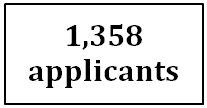
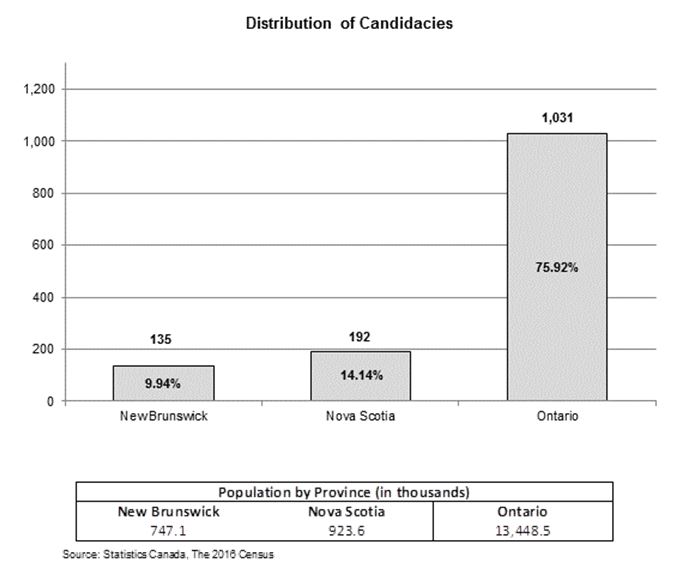
-
Text version for the distribution of candidacies
Distribution of Candidacies Province Number of candidacies Percentage New Brunswick 135 9.94% Nova Scotia 192 14.14% Ontario 1,031 75.92%

-
Text version for the distribution of returning and new applicants
Distribution of Returning and New Applicants Province Number of returning applicants Number of new applicants New Brunswick 86 49 Nova Scotia 125 67 Ontario 744 287
Demographic analysis demonstrates that outreach and communications efforts were effective in reaching Indigenous, linguistic and ethnic minority communities. The Advisory Board also placed particular emphasis on outreach to women’s organizations, as the proportion of women who applied during the previous cycle was below the national workforce availability statistics.
We will continue to monitor demographic data to help inform our outreach efforts in the future.
Gender
Of the 1,358 applicants, 40.8% were female, while 59.2% were male. The percentage of women who applied during this process is slightly below the 2015 national workforce availability estimate (40.8% vs. 48.2%)Footnote 1.
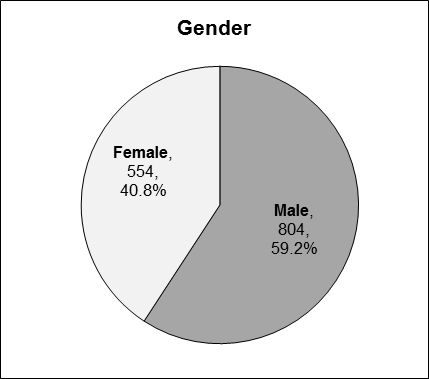
First Official Language
Applicants were asked to identify their first official language. The majority of applicants identified English as their first official language (88.4%), with a smaller number of applicants identifying French as their first official language (11.6%). The representation of applicants who identified French as their first official language was lower when compared with the Canadian population (11.6% vs. 23.2%)Footnote 2. The representation was more favourable when compared with provincial population figures included in this cycle: Ontario (10.3% vs. 4.3%), New Brunswick (30.4% vs. 31.9%) and Nova Scotia (5.2% vs. 3.3%)Footnote 3.
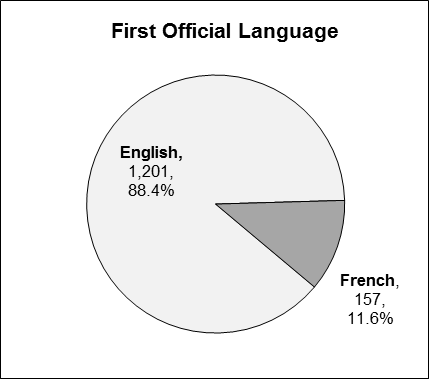
Diversity (self-identified)
Applicants had the option to provide responses to questions regarding diversity when creating their online profile. The LGBTQ, Visible Minority and Indigenous categories had a defined definition, whereas the Ethnic/Cultural Group and persons with disabilities sections were defined by the applicant.

Applicants were able to self-identify in more than one diversity group. A total of 721 applicants self-identified in one or more of the categories provided.
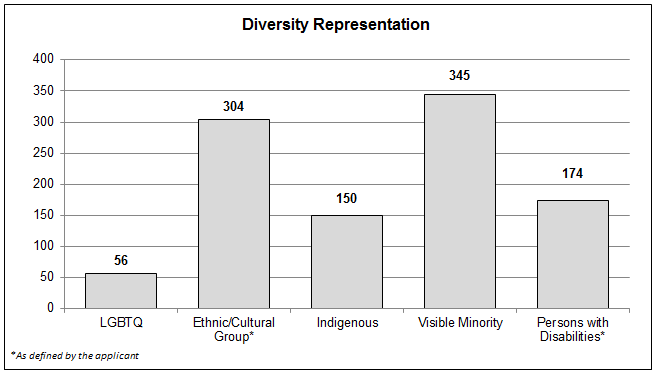
-
Text version for diversity representation
Diversity Representation Group Number of candidacies LGBTQ 56 Ethnic/Cultural Group* 304 Indigenous 150 Visible Minority 345 Persons with Disabilities* 174 *As defined by the applicant
Indigenous representation is significantly higher than Canadian workforce population (11.0% vs. 3.5%)Footnote 4, as is representation of persons with disabilities (12.8% vs. 4.9%). Visible minority representation is also above that of the Canadian workforce population (25.4% vs. 17.8%).
A further breakdown of the data by province can be found in Annex E.
6. Communications, Media and Public Affairs
On December 20, 2016, the Minister of Democratic Institutions announced that the Advisory Board would begin accepting applications for the anticipated Senate vacancies in New Brunswick, Nova Scotia and Ontario.
The following day, the Advisory Board published its report on the first cycle of the permanent process from July to November 2016 and concurrently communicated the launch of the process.
The website content was updated and the revised application form was made available. The Advisory Board’s website also included the assessment criteria, frequently asked questions, and background information on the Advisory Board and the Senate.
7. Consultations and Outreach
The Advisory Boards’ ongoing outreach efforts aim to ensure that a diverse slate of individuals, with a variety of backgrounds, skills, knowledge and experience desirable for a well-functioning Senate are brought forward.
The Advisory Board engaged with national, provincial and local organizations to share information regarding the appointment process broadly among Canadians. Organizations were invited to reach-out to their members and networks to identify high-calibre candidates who met the assessment criteria and encourage them to apply.
In total, to help ensure that the largest number of individuals were made aware of the process, the Advisory Board contacted approximately 790 organizations across the country in December 2016. This was an increase from the 750 organizations that were contacted in the Summer 2016 intake cycle.
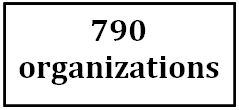
In compiling the list of organizations to contact, the Advisory Board took into consideration the Government of Canada’s intention to achieve gender balance and representation of Indigenous peoples, linguistic, minority and ethnic communities in the Senate, as detailed in the Terms of Reference.
A full list of the organizations that received a direct email communication from the Advisory Board is included in Annex F. These organizations represented Indigenous peoples, women, people with disabilities, LGBTQ groups, linguistic, minority and ethnic communities, service groups, educational and academic organizations, professional and regulatory organizations, the not-for-profit sector, as well as labour and business interests. The number of applicants per vacancy has continued to grow on a cycle by cycle basis.
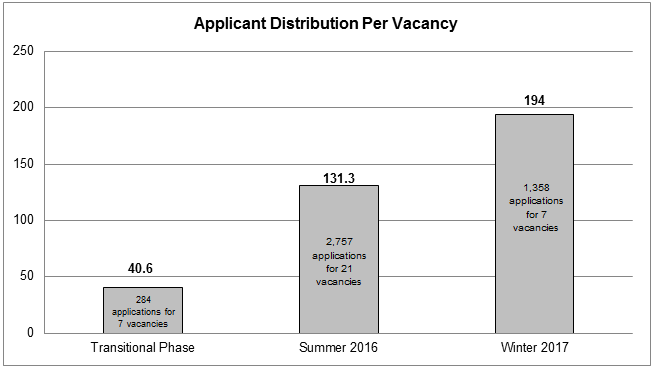
*Summer 2016 includes a vacancy for which a proposed appointment was made, and later declined by the applicant.
-
Text version for applicant distribution per vacancy
Applicant Distribution Per Vacancy Cycle Number of vacancies Number of applications per vacancy Total number of applications Transitional Phase 7 40.6 284 Summer 2016 21 131.3 2,757 Winter 2017 7 194 1,358
8. Meetings of the Advisory Board
A total of three in-person meetings were held in Ottawa during the Winter 2017 process. A number of teleconferences was also used over the course of the cycle to provide updates, engage in discussions and minimize costs related to travel.
Each of the three provincial committees met to review the candidacies received to prepare their recommendations to the Prime Minister.
As noted in the Terms of Reference, the Advisory Board is supported by the Privy Council Office (PCO) and the head of the Senior Personnel Secretariat (or his/her delegate) acts as the ex officio secretary to the Advisory Board.
9. Review process
Members of the Advisory Board conducted a comprehensive and detailed review of the applications submitted for their consideration. Federal members reviewed all 1,358 applications, while the provincial members reviewed only those that were received for their province. Applications were not screened before being provided to the members for their consideration.
Once the members completed their individual reviews, the provincial committees convened in Ottawa to pursue their deliberations. This was consistent with the approach used for previous processes. The meeting atmosphere gave way to fruitful discussions and concluded with a list of recommendations to the Prime Minister. Decisions were achieved using a consensus approach. Deliberations as a result of the further mandate received in May 2017 were conducted via teleconference.
The assessment criteria, as provided by the Prime Minister, were used as the foundation for the review of applications and were applied in a fair and consistent manner. Additionally, the provincial committees took several other factors into consideration, such as gender, diversity, language, age, civic involvement and professional background, as well as the individuals' ability to maintain a non-partisan approach as a Senator.
The recommended candidates were subject to the typical due diligence required for those seeking public office to confirm their suitability.
At all times, the members strove to observe the highest standards of impartiality, integrity, objectivity and confidentiality in consideration of candidates.
10. Recommendation process
In accordance with the original mandate for this cycle, the Advisory Board respected the timeframe requested by the Prime Minister in submitting our recommendations.
A further mandate was issued in May 2017 in order to provide additional recommendations upon the resignation of a Senator (Ontario). No further intake of applications was required. This mandate requested the Advisory Board submit recommendations to the Prime Minister as soon as possible.
We established a list of five qualified candidates for each of the seven vacancies in three provinces, including five for New Brunswick, 15 for Nova Scotia and 15 for Ontario.
The Prime Minister was provided with a package that included the list of recommended candidates. These candidates were not prioritized, but rather listed in alphabetical order. The package included a short synopsis to highlight the merits of each of the recommended candidates, as well as more detailed information from their candidacy submission.
11. Costs
Further to our previous report, we are pleased to provide the final costs for the Summer 2016 process as well as preliminary costs for the current Winter 2017 cycle. In all cycles, the Advisory Board made efforts to minimize expenses.
As with previous reports, the Advisory Board provides estimated costs for the most recent cycle as expenses are still being tabulated. In addition, estimated costs from previous cycles are finalized.
Total costs for the Summer 2016 cycle were $675,150. This included travel expenditures related to the Advisory Board's work and members' per diems (within the range of $550 - $650 for the Chairperson and $375 - $450 for other members), totaling $161,740. This represented the work of 17 board members; three federal members as well as two provincial members for each of the provinces involved (British Columbia, Manitoba, New Brunswick, Nova Scotia, Ontario, Prince Edward Island and Quebec). The remainder of the expenses are incremental costs incurred by the PCO to support the Advisory Board, including salaries and translation costs.
Expenses for the Winter 2017 cycle are still being processed. Estimated costs are in the range of $422,000. Of that amount, estimated travel expenditures for the Advisory Board's in-person meetings and per diems for members' work will total approximately $75,000.
We note that, in accordance with the Advisory Board's Terms of Reference, the costs reported in these reports relate to the Advisory Board's activities. Additional costs incurred by the PCO, in particular those related to information technology, are part of the PCO's operations and are reported through their usual reporting to Parliament.
12. Post-announcement
All applicants who are not appointed to the Senate will receive a message expressing our appreciation for their participation. Furthermore, applicants will be notified that, as new vacancies arise in their province, we will communicate with them to let them know. We will also express our appreciation to the organizations that encouraged individuals to apply and look forward to their continued engagement in future Senate appointment processes. Updates on future opportunities will be posted on the Advisory Board’s website as new information becomes available.
13. Confidentiality
In keeping with the Terms of Reference, the Advisory Board's activities are conducted under strict confidentiality. Information that is brought before the members must be held in confidence and information on candidacies cannot be disclosed, pursuant to the provisions of the Access to Information Act and Privacy Act. Therefore, the Advisory Board will not share publicly any information pertaining to candidates.
14. Conclusion and Next Steps
The Advisory Board appreciates the opportunity to serve its country on such an important initiative and looks forward to continuing its work of providing independent advice to the Prime Minister as part of the next cycle of the permanent process.
Annex A: Terms of Reference for the Advisory Board
Mandate
1 The Independent Advisory Board for Senate Appointments ("Advisory Board") is an independent and non-partisan body whose mandate is to provide non-binding merit-based recommendations to the Prime Minister on Senate nominations.
Composition of the Advisory Board
2 (1) Members of the Advisory Board are appointed pursuant to paragraph 127.1(1)(c) of the Public Service Employment Act as special advisers to the Prime Minister.
(2) The Advisory Board is to consist of
(a) three permanent federal members ("federal members"), one of which is to be appointed as Chairperson; and
(b) two ad hoc members chosen from each of the provinces or territories where a vacancy is to be filled ("provincial members").
(3) The federal members must participate in deliberations relating to all existing and anticipated Senate vacancies.
(4) The provincial members must participate only in deliberations relating to existing and anticipated Senate vacancies in their respective province or territory.
Length of Advisory Board Terms
3 (1) The federal members of the Advisory Board are to be appointed for two-year terms. Provincial members are to be appointed for terms not exceeding one year.
(2) Despite subsection (1), the initial appointments of the federal members will vary in length in order to permit the staggering of terms, as follows:
(a) the term of the first Chairperson is 30 months;
(b) the terms of each of the first two other federal members are 24 months and 18 months respectively.
(3) The terms of Advisory Board members may be renewed.
(4) The Advisory Board is to be convened at the discretion and on the request of the Prime Minister who may establish, revise or extend any of the timelines set out in this mandate.
Support
4 The Advisory Board is to be supported by the Privy Council Office. The head of the Senior Personnel Secretariat, or his or her delegate, acts as an ex officio secretary to the Advisory Board.
Recommendations
5 In accordance with the terms of this mandate, the Advisory Board must provide to the Prime Minister for his consideration, within the time period set by the Prime Minister upon the convening of the Advisory Board, a list of five qualified candidates for each vacancy in the Senate with respect to each province or territory for which there is a vacancy or anticipated vacancy and for which the Advisory Board has been convened. The Prime Minister may take into consideration all of the qualified candidates with respect to all vacancies for that province or territory.
Recommendation Process
6 The members of the Advisory Board must:
(a) at all times, observe the highest standards of impartiality, integrity and objectivity in their consideration of all potential candidates;
(b) meet at appropriate intervals to set out its agenda, assess candidates, and engage in deliberations;
(c) apply fairly and with consistency the criteria provided by the Prime Minister in assessing whether potential candidates meet the qualifications, including those set out in the Constitution Act, 1867, for Senate appointments;
(d) interview potential candidates, at the Advisory Board's discretion, and verify any references provided by potential candidates;
(e) in establishing a list of qualified candidates, seek to support the Government of Canada's intent to achieve gender balance and to ensure representation of Indigenous peoples and linguistic, minority and ethnic communities in the Senate; and
(f) comply with the Privacy Act, the Conflict of Interest Act, and the Ethical and Political Activity Guidelines for Public Office Holders.
7 (1) The members of the Advisory Board must declare any direct or indirect personal interest or professional or business relationship in relation to any candidate if such an interest or relationship could reasonably be considered to represent an actual or perceived conflict of interest.
(2) The declaration set out in subsection (1) must include a statement as to any gifts or hospitality received by the member from the candidate.
(3) If such a declaration is made, the Advisory Board must decide, having regard to the nature of the relationship, if the member must withdraw from any deliberation about the candidate.
(4) If the Advisory Board decides that the member must withdraw from any deliberation in relation to a candidate, those deliberations are undertaken by the remaining members of the Advisory Board, provided the number of members is not less than three.
Consultations
8 (1) In this mandate, "transitional process" means the initial recommendations to be made by the Advisory Board in early 2016 for the appointment of five Senators in order to fill two vacancies in Ontario, one in Quebec and two in Manitoba.
(2) Under the transitional process, the Advisory Board must undertake consultations, which could include groups which represent Indigenous peoples and linguistic, minority and ethnic communities, provincial, territorial and municipal organizations, labour organizations, community-based service groups, arts councils, and provincial or territorial chambers of commerce, in order to ensure that a diverse slate of individuals, with a variety of backgrounds, skills, knowledge and experience desirable for a well-functioning Senate are brought forward for the consideration of the Advisory Board.
9 Subsequent to the transitional process, an open application process is to be established to allow Canadians to apply for appointment to the Senate.
10 Advisory Board members may travel for the purpose of performing their functions, including for meeting with candidates and individuals or groups as part of their consultations.
Confidentiality
11 (1) All personal information provided to, and deliberations of, the Advisory Board are confidential and must be treated in accordance with the provisions of the Privacy Act.
(2) Any records created or received by the Advisory Board members that are under the control or will be under the control of the Privy Council Office are subject to the Access to Information Act and the Privacy Act.
(3) The members of the Advisory Board must maintain as confidential any information brought before them in the conduct of their work.
(4) Members of the Advisory Board must sign a confidentiality agreement as a precondition of their appointment.
12 No candidate is to be named publicly without their prior written consent.
Reporting
13 (1) Within three months after submitting the names of qualified candidates to the Prime Minister, under the transitional process and following each subsequent appointment process, the Advisory Board must provide a report, in both official languages, to the Prime Minister that contains information on the process, including on the execution of the terms of reference, the costs relating to the Advisory Board's activities and statistics relating to the applications received.
(2) In addition, the report may provide recommendations for improvements to the process.
(3) The report must be made public.
Annex B: Biographical notes on the members of the Advisory Board
(Members involved in the Winter 2017 cycle)
Huguette Labelle (Chair)
Huguette Labelle holds a PhD (education) degree from the University of Ottawa, has honorary degrees from twelve Canadian universities, and from the University of Notre Dame, United States. She is a Companion of the Order of Canada. In addition, she is a recipient of the Order of Ontario, the Vanier Medal of the Institute of Public Administration of Canada, the Outstanding Achievement Award of the Public Service of Canada, the McGill University Management Achievement Award and the Francophonie’s Ordre de la Pléiade.
Ms. Labelle is Emeritus Governor of the University of Ottawa, and was Chancellor of the University of Ottawa from 1994 to 2012. She is currently Vice-Chair of the Rideau Hall Foundation Board, Vice-Chair of the International Senior Advisory Board of the International Anti-Corruption Academy, member of the Advisory Group to the Asian Development Bank on Climate Change and Sustainable Development, member of the Board of the Global Centre for Pluralism, Board member of Global Financial Integrity, Board member of the Aga Khan Museum, member of the Advisory Committee of the Order of Ontario and Chair of the Selection Committee for Master's Scholarships on Sustainable Energy Development. Ms. Labelle is also a member of the Advisory Group to the Secretary General of the Organisation for Economic Co-operation and Development (OECD) on Integrity and Anti-Corruption, the University of Ottawa President’s International Advisory Board, and the University of Ottawa Campaign Cabinet. She is also a former Chair of Transparency International, as well as a former Board member of UN Global Compact.
Ms. Labelle also served for a period of nineteen years as Deputy Minister of different Canadian Government departments including Secretary of State, Transport Canada, the Public Service Commission and the Canadian International Development Agency.
Daniel Jutras (Federal member)
Daniel Jutras joined the Faculty of Law, McGill University in 1985 after clerking with Chief Justice Antonio Lamer at the Supreme Court of Canada. He was the Dean of the Faculty of Law from 2009 to 2016. Professor Jutras became as Associate Professor in 1991, and was promoted to the rank of Full Professor in 2001. Since 2011, he has held the Arnold Wainwright Chair in Civil Law. He was awarded one of the Mérites du Barreau du Québec in 2016. He is a former Director of the Institute of Comparative Law and has served as Associate Dean (Admissions and Placement), and Associate Dean (Academic) in the Faculty of Law.
From 2002 to 2004, Professor Jutras was on leave from the Faculty of Law, and acted as personal secretary to the Chief Justice of Canada, the Right Honourable Beverley McLachlin, in the position of Executive Legal Officer of the Supreme Court of Canada.
Professor Jutras' teaching and research interests are in civil law and comparative law, and he now conducts research in the law of obligations from a comparative and pluralist perspective. He is also pursuing research projects on judicial institutions and civil procedure. Professor Jutras is frequently invited to speak on these issues before judicial and academic audiences in Canada and in Europe.
Professor Jutras is a graduate of Harvard Law School, and of Université de Montréal, where he received the Governor General’s Gold Medal. In 2013, Professor Jutras was appointed by the Supreme Court of Canada to serve as amicus curiæ in the Reference re Senate Reform. The same year, he was awarded a Queen Elizabeth II Diamond Jubilee Medal. In 2014, the Barreau du Québec awarded Dean Jutras the Advocatus Emeritus (Ad. E.) distinction.
Indira Samarasekera (Federal member)
Indira Samarasekera served as the 12th President and Vice-Chancellor of the University of Alberta, from 2005 to 2015. She also served as Vice-President Research at the University of British Columbia from 2000 to 2005. She is currently a Senior Advisor for Bennet Jones LLP and serves on the Board of Directors of the Bank of Nova Scotia, and Magna International. She serves on the boards of TransCanada Corporation, the Asia-Pacific Foundation, the Rideau Hall Foundation, the Perimeter Institute of Theoretical Physics and the selection panel for Canada’s Outstanding CEO of the Year. She is also a former Distinguished Fellow in Residence at the Liu Institute for Global Issues at the University of British Columbia.
Dr. Samarasekera is internationally recognized as one of Canada’s leading metallurgical engineers for her groundbreaking work on process engineering of materials, especially steel processing. She held the Dofasco Chair in Advanced Steel Processing at the University of British Columbia. She has consulted widely for industry worldwide leading to the implementation of her research discoveries.
Dr. Samarasekera has also devoted her career to advancing innovation in higher education and the private sector, providing national and international leadership through invited lectures and participation on national and international boards and councils.
She was awarded the Order of Canada in 2002 for outstanding contributions to steel process engineering. In 2014, she was elected to the National Academy of Engineering in the United States, the profession’s highest honour. As a Hays Fulbright Scholar, she earned an MSc from the University of California in 1976. In 1980, she was granted a PhD in metallurgical engineering from the University of British Columbia.
Donald Savoie (member for New Brunswick)
Dr. Donald J. Savoie is a leading Canadian expert on public policy, public administration and federalism. Born in New Brunswick, Dr. Savoie is a proud Acadian who has served as an advisor to several federal, provincial and territorial government departments and agencies, private-sector entities, independent associations, the Organization for Economic Co-operation and Development (OECD), the World Bank, and the United Nations. He currently holds the Canada Research Chair in Public Administration and Governance at the Université de Moncton. He previously held senior positions with the federal government, including Assistant Secretary of the Treasury Board and Deputy Principal of the Canadian Centre for Management Development. Dr. Savoie has also served as a member on several boards of directors for both private and public sector organizations.
A recipient of the Order of Canada and the Order of New Brunswick, Dr. Savoie is also an elected Fellow of the Royal Society of Canada. He has received several awards and prizes for his work internationally, notably the Vanier Gold Medal (1999), the Trudeau Fellowships Prize (2004), the Sun Life Public Service Citation Award (2004), the prestigious 2015 Killam Prize in recognition of his exceptional career achievements in social sciences, and the 2016 Donner Prize for best Canadian book on public policy.
He obtained a D.Phil. in 1979 and a D.Litt. in 2000 from Oxford University and has been awarded seven honorary doctorates by Canadian universities. Dr. Savoie was elected a Visiting Fellow at All Souls College, Oxford in 2006 and named Visiting Professor at the London School of Economics in 2007. He was also a Senior Fulbright Scholar at Harvard University in 2001-2002.
A prolific author, Dr. Savoie has published forty-five books and has written another 200 articles in leading journals of political science, public administration and public policy and in some of the world’s leading newspapers in Canada, the United Kingdom, India and the United States. Averse to cynicism in politics, his extensive knowledge and his experience of great institutions have convinced him of the real possibility that they can be instrumental in furthering the welfare of individuals.
Roxanne Tarjan (member for New Brunswick)
Roxanne Tarjan received a Bachelor of Nursing degree from the University of New Brunswick in 1977. Her career in nursing began in Campbellton, NB, and continued over the next two decades in a variety of positions including: Staff Nurse, Nurse Manager, Assistant Director of Nursing, and Director of Nursing in Bathurst, NB.
Ms. Tarjan joined the Nurses Association of New Brunswick, the professional regulatory organization for registered nurses in that province, in 1998 as a Nursing Practice Consultant, a position she held until being named its Executive Director in 2001. She retired in 2015 after 14 years as Executive Director.
She previously served on the Board of Directors of the Canadian Nurses Protective Society and the Canadian Council of Registered Nurse Regulators, as well as an Advisor to the Board of Directors of the Canadian Nurses Association and a member of the NB2026 Roundtable.
Additionally, Ms. Tarjan recently sat as a Director of Dialogue NB, an organization that promotes and celebrates understanding, respect, appreciation and inclusion among the Francophone and Anglophone cultures of New Brunswick. She is actively involved in and is a contributor to the Giving Society of the New Brunswick Association for Community Living, a non-profit, non-governmental organization that works with individuals living with an intellectual disability and their families. She recently completed a term as a Director of the organization.
Jennifer Gillivan (member for Nova Scotia)
Jennifer Gillivan, ICD.D is President and CEO of the IWK Health Centre Foundation, which raises funds to help the IWK Health Centre provide critical and specialized care to women, children, youth and families throughout the Maritime Provinces.
Ms. Gillivan has an extensive background in philanthropy, partnerships, strategy, marketing and leadership. Born and educated in Dublin, Ireland, she immigrated to Canada in 1982. Prior to joining the IWK Foundation, Ms. Gillivan worked with the Canadian Broadcasting Corporation for 14 years, most recently as Director of Partnerships, Communications, Marketing and Brand for the CBC across Canada. She is an active member of her community, serving on the boards of The Halifax Partnership, the Canadian Children’s Pediatric Hospital Foundations, Children’s Miracle Network CDO Advisory Board and The Sobey School of Business Advisory Board. She is also a past board member of the Nova Scotia Community College Foundation, Churchill Academy, Symphony Nova Scotia, and the Atlantic Film Festival, to name a few.
Ms. Gillivan has received two CBC English Television Awards for her pioneer work with the partnership practice, and has also received the Halifax Ambassador Award and a Progress Halifax Women of Excellence Award. She was listed as one of the top 50 CEO’s of Atlantic Canada for 2014, 2015 and 2017. In 2017 she was awarded the Halifax Chamber of Commerce Business Person of the Year. Ms. Gillivan was awarded the RBC Women of Excellence Entrepreneur Award and the BMO Women’s Leadership Award. Ms. Gillivan is an active member of the Rotman School of Business “Judy Project” Advisory Board and enjoys motivational speaking. She also completed the Ivey School of Business KPMG Community Shift program.
Ramona Lumpkin (member for Nova Scotia)
Dr. Ramona Lumpkin was the President and Vice-Chancellor of Mount Saint Vincent University from 2010 until 2017. She holds a PhD in English Literature from the University of Kentucky and is a former Fulbright Scholar to England. She has held important academic and administrative leadership positions at several universities in Canada and the United States, including Principal of Huron University College and Vice-President Academic and Provost of Royal Roads University in Victoria. In July 2014, she was appointed as a member of the Order of Canada in recognition of her leadership in post-secondary education and her promotion of community-based learning initiatives.
Throughout her career, Dr. Lumpkin has been actively engaged in women’s studies, in advocacy on behalf of women’s issues and in promoting the role of women in higher education. At the University of Kentucky, she served on the founding committee of the annual Women Writers Conference. At Wayne State University, Dr. Lumpkin belonged to the President’s Commission on the Status of Women. In her role at Mount Saint Vincent University, Dr. Lumpkin coordinated the development of the Mount’s new five-year strategic plan, Mount 2017: Making a Difference, and the execution of the university’s most ambitious capital campaign to date, Project TWENTY12, which funded the construction of the Margaret Norrie McCain Centre for Teaching, Learning and Research, a building that celebrates the role women have played in shaping our society.
As past Chair of the Association of Atlantic Universities, Dr. Lumpkin has made significant contributions to the Atlantic region and has become a valued contributor to many organizations and initiatives shaping the future of Nova Scotia. She is currently Chair of Engage Nova Scotia.
Dawn Lavell Harvard (member for Ontario)
Dr. Dawn Lavell Harvard, PhD, is the Director, First Peoples House of Learning at Trent University. Prior to taking on this role in 2016, she served as President of the Native Women’s Association of Canada (NWAC), having previously been Vice-President of NWAC for almost three years.
She is a proud member of the Wikwemikong First Nation, the first Aboriginal Trudeau Scholar, and has worked to advance the rights of Aboriginal women as the President of the Ontario Native Women's Association for 11 years.
Dr. Lavell Harvard is a full-time mother of three girls. She has followed in the footsteps of her mother Jeannette Corbiere Lavell, a noted advocate for Indigenous women’s rights. Since joining the Board of the Ontario Native Women’s Association as a youth director in 1994, Dr. Lavell Harvard has been working toward the empowerment of Aboriginal women and their families.
She was co-editor of the original volume on Indigenous Mothering entitled “Until Our Hearts Are on the Ground: Aboriginal Mothering, Oppression, Resistance and Rebirth” and has since released “Mothers of the Nations,” which she co-edited with Kim Anderson, and “Forever Loved: Exposing the Hidden Crisis of Missing and Murdered Indigenous Women and Girls in Canada,” which she co-edited with Jennifer Brant.
Murray Segal (member for Ontario)
Following a distinguished career with the Ontario government, including eight years as Deputy Attorney General of Ontario and former Deputy Minister Responsible for Aboriginal Affairs, Murray Segal now practices as independent legal counsel and consultant in Toronto. He is also counsel to Henein Hutchinson LLP. His practice includes assisting the public and broader public service in improving the delivery of services.
Mr. Segal was the chief legal advisor to the Government of Ontario and advisor to Cabinet, the Attorney General, other Ministers, and Deputy Ministers. He oversaw all government litigation and is experienced in developing legislation.
Prior to his time as the Deputy Attorney General, Mr. Segal was the Chief Prosecutor for the Province of Ontario, leading the largest prosecution service in Canada.
Mr. Segal is certified as a Criminal Law Specialist by the Law Society of Upper Canada and is the author of numerous legal publications including in the areas of the Canadian Charter of Rights and Freedoms, disclosure, and procedure. He is also a frequent participant in continuing education programs.
Mr. Segal is on the Board of Directors of the Canadian Mental Health Association of Toronto and on the Board of Trustees of the Centre for Addiction and Mental Health. In 2013, he was appointed as a member of the Ontario Review Board. In October 2015, Mr. Segal released a Report to the Province of Nova Scotia on the justice system’s handling of the Rehtaeh Parsons matter.
Annex C: Assessment Criteria
Constitutional eligibility requirements
An individual must meet the constitutional eligibility requirements at the time of appointment to the Senate.
Age
An individual must be a minimum of 30 years of age and be less than 75 years of age.
Citizenship
An individual must be a citizen of Canada.
Net Worth in Real and Personal Property
An individual must own property with a net value of $4,000 in the province for which he or she is appointed, and have an overall net worth of $4,000 in real and personal property.
In the case of Quebec, a nominee must have his or her real property qualification in the electoral division for which he or she is appointed, or be resident in that electoral division.
- Senators from Quebec must represent one of 24 electoral divisions.
Residency
An individual must be a resident of the province for which he or she is appointed.
- An individual must have his or her place of permanent residence in the province or territory of vacancy at the time of application and appointment. The permanent residence of an individual is where the person is ordinarily present and has made his or her home for a minimum period of two years leading up to the application. The individual must provide documentation of residence in the province or territory.
- Despite rule 1, an exception to the two-year requirement may be made in a case where an individual is temporarily absent from the province or territory of vacancy for reasons of employment or education but can provide satisfactory proof he or she intends to return to his or her permanent residence in the province or territory of vacancy.
Merit-based criteria established by the Government
Gender, Indigenous and Minority Balance
Individuals will be considered with a view to achieving gender balance in the Senate. Priority consideration will be given to individuals who represent Indigenous peoples and linguistic, minority and ethnic communities, with a view to ensuring representation of those communities in the Senate consistent with the Senate's role in minority representation.
Non-Partisanship
Individuals will be asked to demonstrate to the Advisory Board that they have the ability to bring a perspective and contribution to the work of the Senate that is independent and non-partisan. They will also have to disclose any political involvement and activities. Past political activities would not disqualify a nominee.
Knowledge Requirement
Individuals must demonstrate a solid knowledge of the legislative process and Canada's Constitution, including the role of the Senate as an independent and complementary body of sober second thought, regional representation and minority representation.
Personal Qualities
Individuals must demonstrate outstanding personal qualities, including adhering to the principles and standards of public life, ethics, and integrity.
Individuals must demonstrate an ability to make an effective and significant contribution to the work of the Senate, not only in their chosen profession or area of expertise, but the wide range of other issues that come before the Senate.
Qualifications Related to the Role of the Senate
An individual must demonstrate one of the following criteria:
- a high level of experience, developed over many years, in the legislative process and public service at the federal or provincial/territorial level; and/or,
- a lengthy and recognized record of service to one's community, which could include one's Indigenous, ethnic or linguistic community; and/or,
- recognized leadership and an outstanding record of achievement in the nominee's profession or chosen field of expertise.
Asset Qualifications
Bilingualism: fluency in both official languages will be considered an asset.
Annex D: News Releases
The Independent Advisory Board for Senate Appointments launches new application intake and publishes its report
(December 21, 2016)
Process to fill upcoming Senate vacancies in New Brunswick, Nova Scotia and Ontario begins
(December 20, 2016)
List of anticipated Senate vacancies in New Brunswick, Nova Scotia and Ontario in 2017
(December 20, 2016)
Prime Minister announces intention to recommend the appointment of six new Senators
(November 2, 2016)
Prime Minister announces intention to recommend the appointment of six new Senators
(October 31, 2016)
Prime Minister announces intention to recommend the appointment of nine new Senators
(October 27, 2016)
Prime Minister announces intention to recommend the appointment of seven new Senators
(March 18, 2016)
Minister of Democratic Institutions announces launch of the permanent phase of the independent Senate appointments process
(July 7, 2016)
Report of the Independent Advisory Board for Senate Appointments
(April 5, 2016)
Minister of Democratic Institutions announces establishment of the Independent Advisory Board for Senate Appointments
(January 19, 2016)
Government Announces Immediate Senate Reform
(December 3, 2015)
Annex E: Statistics on Candidacies
Summary
Key facts (based on 2011 Census data)Footnote 5:
The percentage of women who applied is below the Canadian workforce population (40.8% vs. 48.2%).
The percentage of applicants identifying French as their first official language is lower than the Canadian population representation (11.6% vs. 23.2%).
Indigenous representation is significantly higher than the Canadian workforce population (11.0% vs. 3.5%).
Visible minority representation is higher than the Canadian workforce population (25.4% vs. 17.8%).
Representation of persons with disabilities is higher than the Canadian workforce population (12.8% vs. 4.9%).




-
Text version for diversity representation
Diversity Representation Group Number of candidacies LGBTQ 56 Ethnic/Cultural Group* 304 Indigenous 150 Visible Minority 345 Persons with Disabilities* 174 *As defined by the applicant
New Brunswick
Key facts (based on 2011 Census data):
- Representation of women is below the New Brunswick workforce population (38.5% vs. 48.3%).
- The percentage of applicants identifying French as their first official language is slightly lower than the New Brunswick population representation (30.4% vs. 31.9%).
- Indigenous representation is considerably higher than the New Brunswick workforce population (10.4% vs. 2.6%).
- Visible minority representation is significantly above that of the New Brunswick workforce population (8.9% vs. 2.2%).
- Representation of persons with disabilities is significantly higher than the New Brunswick workforce population (16.3% vs. 5.3%).
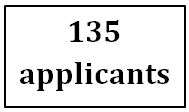
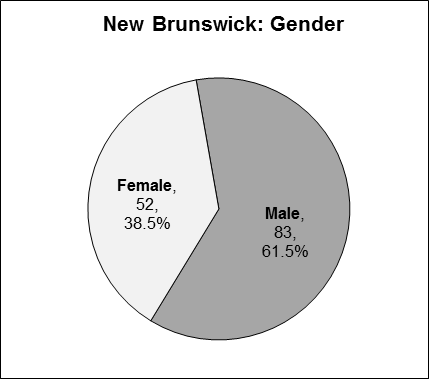
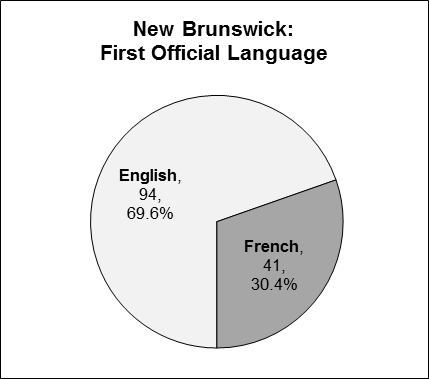
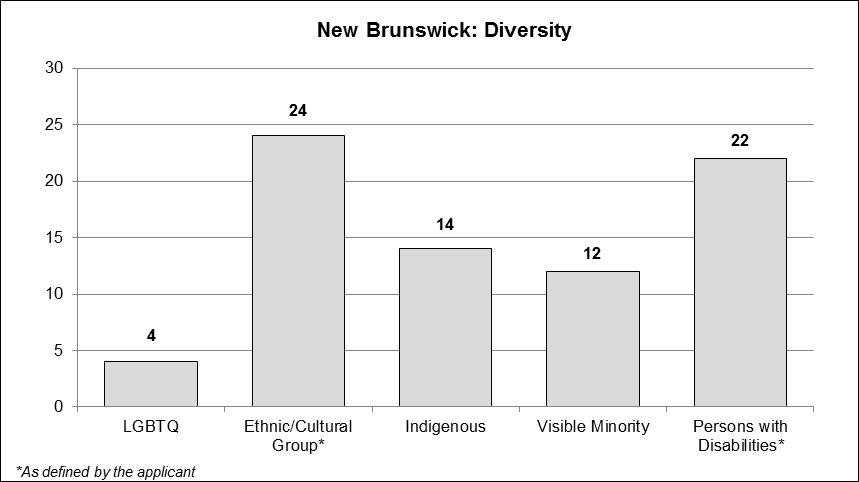
-
Text version for diversity representation in New Brunswick
New Brunswick: Diversity Group Number of candidacies LGBTQ 4 Ethnic/Cultural Group* 24 Indigenous 14 Visible Minority 12 Persons with Disabilities* 22 *As defined by the applicant
Nova Scotia
Key facts (based on 2011 Census data):
- Representation of women is below the Nova Scotia workforce population (39.6% vs. 49.2%).
- The percentage of applicants identifying French as their first official language is slightly higher than the Nova Scotia population representation (5.2% vs. 3.3%).
- Indigenous representation is significantly higher than the Nova Scotia workforce population (11.5% vs. 3.4%).
- Visible minority representation is above that of the Nova Scotia workforce population (9.9% vs. 4.5%).
- Representation of persons with disabilities is higher than the Nova Scotia workforce population (15.6% vs. 7.2%).
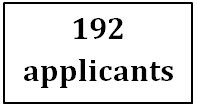
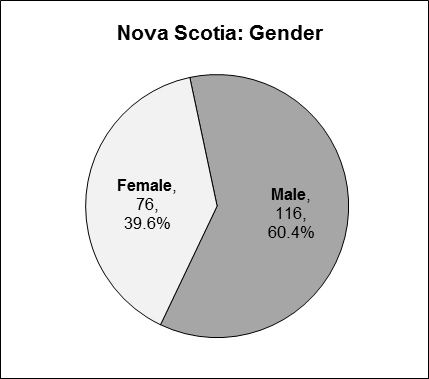
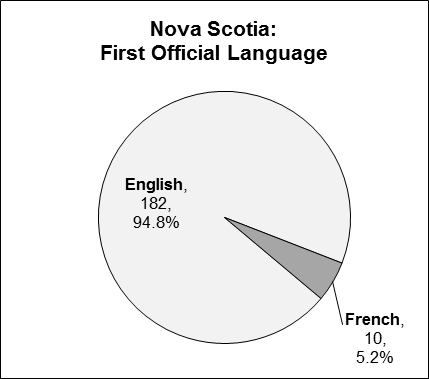
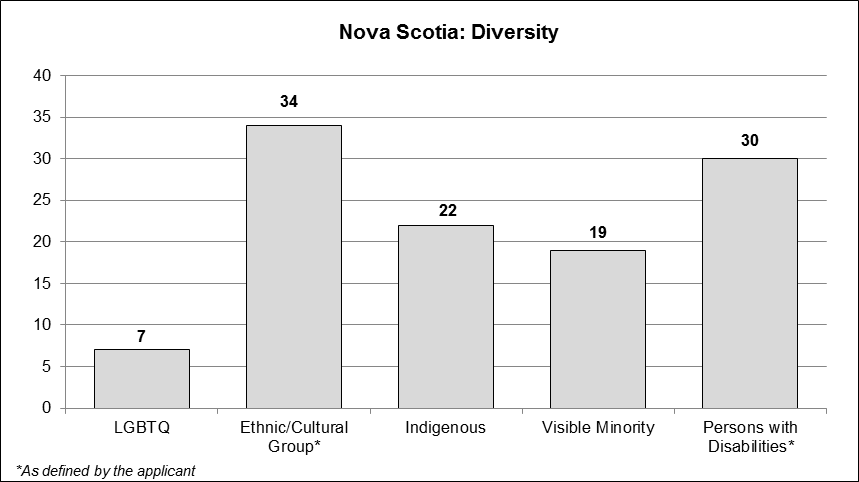
-
Text version for diversity representation in Nova Scotia
Nova Scotia: Diversity Group Number of candidacies LGBTQ 7 Ethnic/Cultural Group* 34 Indigenous 22 Visible Minority 19 Persons with Disabilities* 30 *As defined by the applicant
Ontario
Key facts (based on 2011 Census data):
- Representation of women is below the Ontario workforce population (41.3% vs. 48.7%).
- The percentage of applicants identifying French as their first official language is higher than the Ontario population representation (10.3% vs. 4.3%).
- Indigenous representation is significantly higher than the Ontario workforce population (11.1% vs. 2.1%).
- Visible minority representation is above that of the Ontario workforce population (30.5% vs. 24.4%).
- Representation of persons with disabilities is higher than the Ontario workforce population (11.8% vs. 5.5%).
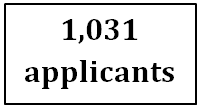
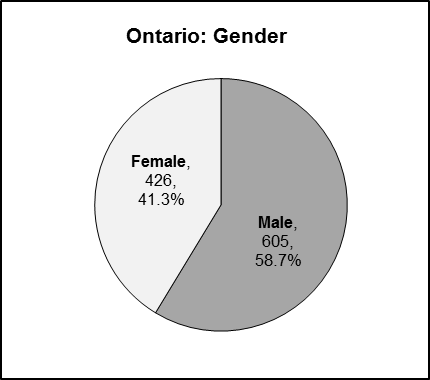
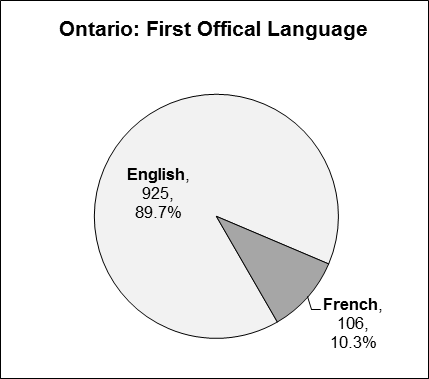
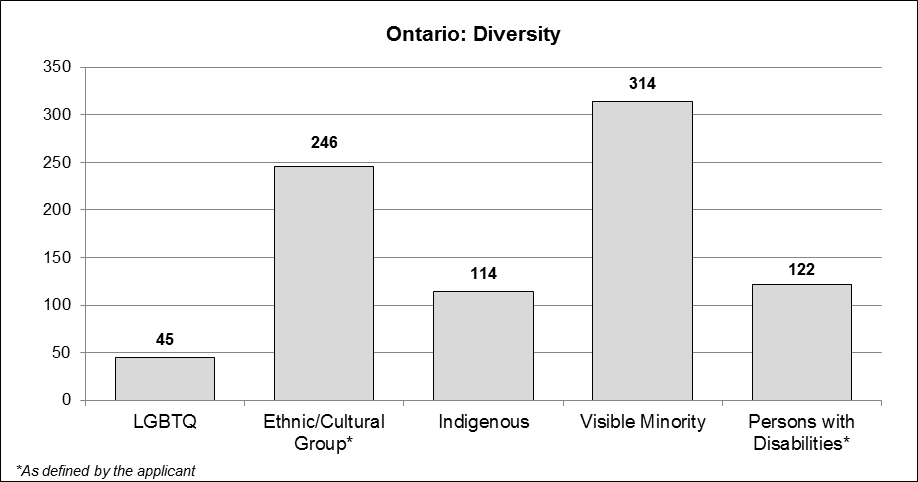
-
Text version for diversity representation in Ontario
Ontario: Diversity Group Number of candidacies LGBTQ 45 Ethnic/Cultural Group* 246 Indigenous 114 Visible Minority 314 Persons with Disabilities* 122 *As defined by the applicant
Annex F: List of organizations
Building on the guidance for the transitional process included in the Terms of Reference, the Advisory Board chose to undertake broad-based outreach efforts to communicate information about the application process for the subsequent rounds of recommendations for Senate appointments. The list below was developed by the Advisory Board prior to the launch of the process and includes only those organizations that received an official email communication from the Advisory Board (organization names are listed in the language submitted by the Advisory Board members). It also includes organizations located in provinces that had vacancies in previous cycles, such as Quebec, in order to support broad awareness. Additional outreach was undertaken by members through both direct and indirect communication approaches, such as email, phone calls and in-person contact.
| Organizations |
|---|
| 55+ BC Games (BC Seniors Games Society) |
| A & O: Support Services for Older Adults |
| Aboriginal Business Education Partners, University of Manitoba |
| Aboriginal Chamber of Commerce |
| Aboriginal Financial Officers Association of BC |
| Aboriginal Health and Wellness Centre of Winnipeg Inc. |
| Aboriginal Social Work Society in Manitoba |
| Aboriginal Tourism Association of BC |
| Aboriginal Vision for the North End |
| Aboriginal Women's Association of PEI |
| Aboriginal Women's Professional Association |
| Acadia Divinity College |
| Acadia First Nation |
| Acadia University |
| Action ontarienne contre la violence faite aux femmes |
| Adsum for women and children |
| Adult Vocational Training - Dartmouth |
| Affiliation of Multicultural Societies and Services Agencies of BC |
| African Communities of Manitoba Inc. |
| Aga Khan Foundation for Canada |
| Alliance Arc-en-ciel Québec |
| ALS Society of New Brunswick and Nova Scotia |
| Alzheimer Society Nova Scotia |
| Amherst and Area Chamber of Commerce |
| Andrews Street Family Centre |
| Anglican Church of Canada |
| Annapolis Valley First Nation |
| Antigonish Women's Resource Centre |
| AODA Alliance |
| Art City |
| Art Gallery of Nova Scotia |
| Art Gallery of Ontario |
| Arthritis Society (Manitoba Division) |
| Arts BC |
| Artscape |
| Assemblée des Premières Nations du Québec et du Labrador |
| Assembly of First Nations |
| Assembly of First Nations - Council of Women |
| Assembly of Manitoba Chiefs |
| Assembly of Nova Scotia Mi'kmaq Chiefs |
| Association des conseils scolaires des écoles publiques de l'Ontario |
| Association des enseignantes et des enseignants franco-ontariens |
| Association des services de garde en milieu scolaire |
| Association for Co-operative Education |
| Association for Manitoba Archives |
| Association franco-ontarienne des conseils scolaires catholiques |
| Association Musées Nouveau-Brunswick |
| Association nationale des éditeurs de livres |
| Association of Atlantic Universities |
| Association of Canadian Publishers |
| Association of Community Colleges of Canada |
| Association of Management, Administrative and Professional Crown Employees of Ontario |
| Association of Municipalities of Ontario |
| Association of Progressive Muslims of Canada |
| Association of Registered Nurses of Prince Edward Island |
| Association Québécoise des Centres de la Petite Enfance |
| Association québécoise du loisir municipal |
| Association québécoise pour le loisir des personnes handicapées |
| Associations of Colleges and Universities |
| Ateliers cinq épices |
| Atlantic Chamber of Commerce |
| Atlantic Council for International Cooperation |
| Atlantic Film Festival |
| Atlantic Policy Congress of First Nationals Chiefs Secretariat |
| Atlantic Provinces Library Association |
| Atlantic School of Theology |
| Aurora Family Therapy Centre |
| Awasis Agency of Northern Manitoba |
| AWO Refugee & Immigrant Services |
| Az-Zahraa Islamic Centre |
| B'nai Brith Canada |
| Banque de Montréal |
| Banques alimentaires du Québec |
| Barreau du Québec |
| BC Agricultural Council |
| BC Association of Aboriginal Friendship Centres |
| BC Association of Community Response Networks |
| BC Chamber of Commerce |
| BC Children's Hospital |
| BC Federation of Labour |
| BC Government and Service Employees Union |
| BC Heritage Fairs |
| BC Muslim Association |
| BC Salmon Farmers Association |
| BC Teachers Federation |
| BC Wheelchair Sports Association |
| BC Young Farmers Association |
| Bear River First Nation |
| Big Brothers Big Sisters of Greater Halifax |
| Big Brothers Big Sisters of Winnipeg |
| Bishop's University |
| Black Business Initiative |
| Black Cultural Centre for Nova Scotia |
| Boys & Girls Clubs of Greater Halifax |
| Boys & Girls Clubs of Winnipeg |
| Brandon University |
| Bridgewater Area Chamber of Commerce |
| British Columbia Aboriginal Network on Disability Society |
| British Columbia Arts Council |
| British Columbia Association of Police Boards |
| British Columbia Environment Industry Association |
| British Columbia Historical Federation |
| British Columbia Institute of Technology |
| British Columbia Library Association |
| British Columbia Museums Association |
| British Columbia Psychological Association |
| British Columbia Women's Institute |
| Brock University |
| Business Council of Canada |
| Business Council of Manitoba |
| Caledon Institute of Social Policy |
| Camosun College |
| Canada's National Artillery Museum |
| Canada's National Ballet School |
| Canadian Academy of Engineering |
| Canadian Association for the Advancement of Women and Sport and Physical Activity |
| Canadian Association for the Fifty-Plus |
| Canadian Association of Chiefs of Police |
| Canadian Association of Management Consultants |
| Canadian Association of Midwives |
| Canadian Association of Paediatric Health Centres |
| Canadian Association of Social Workers |
| Canadian Association of University Teachers |
| Canadian Bar Association |
| Canadian Bar Association - British Columbia |
| Canadian Bar Association - New Brunswick |
| Canadian Bar Association - Nova Scotia |
| Canadian Bar Association - Prince Edward Island |
| Canadian Bar Association - Québec |
| Canadian Breast Cancer Foundation - Dartmouth Chapter |
| Canadian Centre for Ethics in Sport |
| Canadian Centre for Gender and Sexual Diversity |
| Canadian Chamber of Commerce |
| Canadian Christian Relief and Development Association |
| Canadian Community Economic Development Network - Manitoba |
| Canadian Conference of Catholic Bishops |
| Canadian Council of Churches |
| Canadian Council of Muslim Women |
| Canadian Council of Muslim Women - PEI/Halifax Chapter |
| Canadian Council of Registered Nurse Regulators |
| Canadian Council on International Cooperation |
| Canadian Deaf Sports Association |
| Canadian Education Association |
| Canadian Environmental Law Association |
| Canadian Ethnocultural Council |
| Canadian Federation of Business and Professional Women |
| Canadian Federation of Independent Business |
| Canadian Federation of Students - Ontario |
| Canadian Federation of University Women |
| Canadian Federation of University Women - Atlantic Chapter |
| Canadian Federation of University Women - Ontario Chapter |
| Canadian Film Centre |
| Canadian Foundation for Health Care Improvement |
| Canadian Foundation for Women's Health |
| Canadian Labour Congress |
| Canadian Lawyers for International Human Rights |
| Canadian Lesbian and Gay Archives |
| Canadian Manufacturers and Exporters |
| Canadian Medical Association |
| Canadian Mennonite University |
| Canadian Mental Health Association |
| Canadian Mental Health Association - British Columbia |
| Canadian Mental Health Association - Halifax-Dartmouth |
| Canadian Mental Health Association - New Brunswick |
| Canadian Mental Health Association - Prince Edward Island |
| Canadian Mental Health Association - Winnipeg |
| Canadian Museum Association |
| Canadian Muslim Women's Institute |
| Canadian National Institute for the Blind - Manitoba |
| Canadian Nurses Association |
| Canadian Nurses Protective Society |
| Canadian Opera Company |
| Canadian Paralympic Committee |
| Canadian Paraplegic Association (Manitoba) |
| Canadian Paraplegic Association (Nova Scotia) |
| Canadian Psychological Association |
| Canadian Public Health Association |
| Canadian Red Cross |
| Canadian Red Cross Society (Manitoba Region) |
| Canadian Research Institute for the Advancement of Women |
| Canadian School Boards Association |
| Canadian Sport Institute Ontario |
| Canadian Teacher's Federation |
| Canadian Union of Public Employee - PEI |
| Canadian Union of Public Employees |
| Canadian Vehicle Manufacturers Association |
| Canadian Wildlife Federation |
| Canadian Women Construction |
| Canadian Women's Foundation |
| Cancer Care Ontario |
| Cape Breton University |
| Capilano University |
| Capsana |
| CARE |
| Caregivers Nova Scotia |
| Carleton University |
| Carrefour action municipale |
| Centraide du Grand Montréal |
| Centrale des syndicats du Québec |
| Centre culturel franco-manitobain |
| Centre for Addiction and Mental Health |
| Centre for Research and Education on Violence Against Women and Children |
| Centre for Women in Business (Mount Saint Vincent University) |
| Centre francophone de Toronto |
| Centre ontarien de prévention des agressions |
| Centre Renaissance Centre |
| Certified General Accountants Association of Nova Scotia |
| Certified Organic Associations of BC |
| Chambre de Commerce LGBT du Québec |
| Chambre des notaires de Québec |
| Charlottetown Police Services |
| Chartered Professional Accountants Canada |
| Chartered Professional Accountants - British Columbia |
| Chartered Professional Accountants - Nova Scotia |
| Chartered Professional Accountants - Ontario |
| Chef's Table Society of British Columbia |
| Chiefs of Ontario |
| Child and Youth Care Association of New Brunswick |
| Chinese Professionals Association of Canada |
| Chinese Society of Nova Scotia |
| Christian Horizons |
| Churchill Academy |
| City of Toronto |
| Clean Air Partnership |
| Clean Foundation |
| Climate Action Network |
| Club de la médaille d'or |
| Coalition des Familles LGBT |
| Coalition québécoise sur la problématique du poids |
| Collège Acadie Î.-P.-É. |
| Collège des médecins |
| College of Licensed Practical Nurses of Nova Scotia |
| College of New Caledonia |
| College of Physicians and Surgeons of New Brunswick |
| College of Physicians and Surgeons of Nova Scotia |
| College of Physicians and Surgeons of Prince Edward Island |
| College of Registered Nurses of British Columbia |
| College of Registered Nurses of Nova Scotia |
| College of the Rockies |
| Colleges Ontario |
| Commissaire à la santé et au bien-être du Québec |
| Commission d'enquête sur les femmes disparues ou assassinées |
| Commission de développement des Ressources Humaines des Premières Nations du Québec |
| Commission de la Santé et des Services Sociaux des Premières Nations |
| Commission des droits de la personne et de la jeunesse du Québec |
| Community Education Development Association |
| Community Financial Counselling Services |
| Community Food Centers |
| Community Foundations of Canada |
| Community Living BC |
| Community Living Ontario |
| Community Living Winnipeg |
| Community Ownership Solutions Inc. |
| Community Social Services Employers Association of BC |
| Community Unemployed Help Centre |
| Concordia University |
| Confederacy of Mainland Mi'kmaq |
| Confédération des syndicats nationaux |
| Congress of Aboriginal Peoples |
| Congress of Black Women of Manitoba Inc. |
| Conseil de la magistrature du Canada |
| Conseil de la magistrature du Québec |
| Conseil des initiatives pour le progrès en alimentation |
| Conseil du statut de la femme |
| Conseil québécois du loisir |
| Consulting Engineers of Nova Scotia |
| COSTI Immigrant Services |
| Council of Forest Industries |
| Council of Ontario Universities |
| Council of Women of Winnipeg |
| CPA Education Foundation |
| Craft Council of British Columbia |
| Cree Nation Tribal Health Centre |
| Croquarium |
| Culture PEI |
| Cuso International |
| Daily Bread Food Bank |
| Dalhousie University |
| David Suzuki Foundation |
| Developmental Disabilities Association |
| Dialogue New Brunswick |
| Disability Alliance BC |
| Doctors of British Columbia |
| Douglas College |
| Dragonfly Centre for Autism |
| EAGLE Urban Transition Centre |
| Ecojustice |
| École de Technologie supérieur |
| École national d'administration publique |
| École Polytechnique de Montréal |
| Education Quality and Accountability Office |
| Education Workers' Alliance of Ontario |
| Égale Action |
| Egale Canada Human Rights Trust |
| Elementary Teachers' Federation of Ontario |
| Elizabeth Fry Society of Manitoba |
| Elmwood Community Resource Centre and Area Association Inc. |
| Emily Carr University of Art and Design |
| End Homelessness Winnipeg |
| Engage Nova Scotia |
| Engineering Institute of Canada |
| Engineers & Geoscientists of New Brunswick |
| Engineers Nova Scotia |
| Engineers Prince Edward Island |
| Engineers without Borders |
| Environment Probe |
| Environmental Defence |
| Environmental Health Association of BC |
| Equal Voice |
| Equal Voice - New Brunswick Chapter |
| Equal Voice - Nova Scotia Branch |
| Équiterre |
| Eskasoni First Nation |
| Extenso |
| Eyaa-Keen Healing Centre Inc. |
| Family Dynamics |
| Farm Folk City Folk |
| Fédération comité de parents Québec |
| Fédération Commissions scolaires Québec |
| Fédération de l'Âge D'Or du Québec - Île de Montréal |
| Fédération de l'Âge D'Or du Québec |
| Fédération des Chambres de commerce du Québec |
| Fédération des Communautés Francophones et Acadiennes |
| Fédération des femmes Acadiennes de la Nouvelle-Écosse |
| Fédération des femmes acadiennes et francophones du Nouveau-Brunswick |
| Fédération des femmes du Québec |
| Fédération des syndicats de l'enseignement |
| Fédération des travailleurs et travailleuses du Québec |
| Fédération éducateurs physiques enseignants au Québec |
| Fédération kinésiologues du Québec |
| Federation of Canadian Municipalities |
| Federation of Law Societies |
| Federation of Muslim Women |
| Fédération professionnelle des journalistes du Québec |
| Fédération québécoise des municipalités |
| Fire Fighters Association of Ontario |
| Fisheries Museum of the Atlantic |
| Fondation des maladies du coeur et de l'AVC |
| Fondation des Patros |
| Fondation du Grand Montréal |
| Fondation OLO |
| Forest Products Association of Canada |
| Fort Garry Women's Resource Centre |
| Fusion Halifax |
| Gaelic Council of Nova Scotia |
| Georgian Bay Native Women's Association |
| Girl Guides - Manitoba |
| Global Diversity Exchange |
| Glooscap First Nation |
| Good Neighbours Active Living Centre |
| Graffiti Art Programming |
| Greater Halifax Partnership |
| Greater Moncton Chamber of Commerce |
| Greater Vancouver Board of Trade |
| Greater Victoria Chamber of Commerce |
| Green Table Network |
| Groupe entreprises en santé |
| Guid'amies franco-manitobains |
| Greater Charlottetown Area Chamber of Commerce |
| Habitat for Humanity Canada |
| Halifax Chamber of Commerce |
| Health Association Nova Scotia |
| Health PEI |
| Healthy Minds Cooperative |
| HeartWood Centre for Community Youth Development |
| HEC Montreal |
| Heritage BC |
| Holland College |
| Hospice Palliative Care Association of PEI |
| Hot Docs |
| Human Development Council |
| Humania Assurance |
| Humanitarian Coalition |
| Huron University College |
| IMAGINE Canada |
| ImagineAbility |
| Immigrant & Refugee Community Organization of Manitoba |
| Immigrant and Multicultural Services Society |
| Immigrant Centre Manitoba Inc. |
| Immigrant Women Services Ottawa |
| Immigrant Women's Association of Manitoba |
| Inclusion BC |
| Independent Electricity System Operator |
| Independent Living Resource Centre |
| Indo-Canadian Women's Association |
| Infirmières et infirmiers sans frontières |
| Institut national de la recherche scientifique |
| Institute for Ocean Research Enterprise |
| Institute of Corporate Directors |
| International Institute for Sustainable Development |
| International Institute of Women's Rights - Manitoba |
| International Women's Forum, Atlantic Chapter |
| Inuit Tapiriit Kanatami |
| Italian Canadian Cultural Association of Nova Scotia |
| Jamaican Canadian Association |
| Jewish Child and Family Services |
| Jewish Federation of Greater Vancouver |
| Jewish Foundation of Manitoba |
| Jewish Heritage Centre of Western Canada |
| John Howard Society of Manitoba |
| Junior Achievement Nova Scotia |
| Justice Institute of British Columbia |
| Kã Ni Kãnichihk |
| KAIROS |
| Keewatin Tribal Council |
| Kelowna Chamber of Commerce |
| Kildonan Youth Activity Centre |
| Knowles Centre Inc. |
| Kwantlen Polytechnic University |
| L'Assemblée de la francophonie de l'Ontario |
| L'Association des enseignantes et des enseignants francophones du Nouveau-Brunswick |
| La Chambre de commerce acadienne et francophone de I'Î.-P.-É. |
| La Société de l'Acadie du Nouveau-Brunswick |
| Lakehead University |
| L'Alliance des Femmes de la Francophonie Canadienne |
| Langara College |
| L'Arche Winnipeg Inc. |
| Laurentian University |
| Law Society of Manitoba |
| Law Society of New Brunswick |
| Law Society of PEI |
| Law Society of Upper Canada |
| Le Cercle Molière |
| Le Conseil d'entreprises du Nouveau-Brunswick |
| Le Conseil économique du Nouveau-Brunswick inc. |
| Learning Disabilities Association of Manitoba |
| Learning Disabilities Association of PEI |
| Lebanese Chamber of Commerce in Nova Scotia |
| Legal Information Society of Nova Scotia |
| Les Impatients |
| LOUD Business |
| Ma Mawi Wi Chi Itata Centre |
| Macdonald Youth Services |
| Main Street Project |
| Maison d'Amitié |
| Ma-Mow-We-Tak Friendship Centre |
| Manitoba 4-H Council Office |
| Manitoba Archaeological Society |
| Manitoba Arts Council |
| Manitoba Association for Rights and Liberties |
| Manitoba Association of Newcomer Serving Organizations |
| Manitoba Bar Association |
| Manitoba Chamber of Commerce |
| Manitoba Council for International Cooperation |
| Manitoba Farm Women's Conference |
| Manitoba Federation of Labour |
| Manitoba Film & Music |
| Manitoba Foundation for the Arts Inc. |
| Manitoba Genealogical Society Inc. |
| Manitoba Heritage Council |
| Manitoba Historical Society |
| Manitoba Interfaith Immigration Council |
| Manitoba Keewatinowi Okimakanak |
| Manitoba League for Persons with Disabilities |
| Manitoba Métis Federation |
| Manitoba School Improvement Program |
| Manitoba Women's Institute |
| Manitoba Writers' Guild |
| Manufacturiers et Exportateurs du Québec |
| Maples Youth Activity Centre |
| Maritime Conservatory of Performing Arts |
| Maritime Museum of the Atlantic |
| Marlene Street Resource Centre |
| Martin Prosperity Institute |
| Marymound |
| MATCH International |
| Maytree Foundation |
| McGill University |
| McMaster University |
| Meals on Wheels of Winnipeg |
| Médecins sans frontières |
| Mediation Services: A Community Resource for Conflict Resolution |
| Medical Society of PEI |
| Membertou First Nation |
| Mental Health Foundation of Nova Scotia |
| Mental Health Commission of Canada |
| Métis National Council |
| Metrolinx |
| Metropolitan Action Committee on Violence Against Women and Children |
| Mi'kmaq Confederacy of PEI |
| Mi'kmaw Economic Benefits Office |
| Mi'kmaw Kina'matnewey |
| Mi'kmaw Native Friendship Centre |
| Millbrook First Nation |
| Minwaashin Lodge Aboriginal Women's Support Centre |
| Mood Disorders Association of Manitoba |
| Mount Allison University |
| Mount Carmel Clinic |
| Mount St. Vincent University |
| Multicultural Council of PEI |
| Multiple Sclerosis Society of Canada - Winnipeg Chapter |
| Music Canada |
| Muslim Association of New Brunswick |
| National Association of Friendship Centres |
| National Association of Women Lawyers |
| National Ballet School |
| National Screen Institute |
| National Trust for Canada |
| Native Council of Nova Scotia |
| Native Council of PEI |
| Native Women's Resource Centre of Toronto |
| Native Women's Association of Canada |
| Native Women's Transition Centre |
| Nature Canada |
| Ndinawemaaganag Endaawaad |
| Neptune Theatre |
| New Brunswick Aboriginal Peoples Council |
| New Brunswick Association of Community Business Development Corporation |
| New Brunswick College of Pharmacists |
| New Brunswick Craft Council |
| New Brunswick Firefighters Association |
| New Brunswick for Community Living |
| New Brunswick interscholastic athletic association |
| New Brunswick Medical Society |
| New Brunswick Multicultural Council Inc |
| New Brunswick Nurses Union |
| New Brunswick Public Libraries |
| New Brunswick Senior Citizens Federation |
| New Brunswick Teachers' Association |
| New Brunswick Teachers' Federation |
| New Brunswick Women's Council |
| New Brunswick Women's Institute |
| New Directions for Children, Youth, Adults and Families |
| New Life Ministries |
| Nicola Valley Institute of Technology |
| North End Community Renewal Corporation |
| North End Women's Centre |
| North Island College |
| North Point Douglas Women's Centre |
| Northern Association of Community Councils |
| Northern Lights College |
| Northwest Community College |
| Northwestern Ontario Women's Centre |
| NorWest Co-op Community Health |
| Nova Scotia Barristers' Society |
| Nova Scotia Business Inc. |
| Nova Scotia College of Art and Design |
| Nova Scotia Community College |
| Nova Scotia Disabled Persons Commission |
| Nova Scotia Environmental Network |
| Nova Scotia Government and General Employees Union |
| Nova Scotia Health Research Foundation |
| Nova Scotia Human Rights Commission |
| Nova Scotia Museum of Natural History |
| Nova Scotia Native Women's Association |
| Nova Scotia Rainbow Action Project |
| Nurses Association of New Brunswick |
| Observatoire de la qualité de l'offre alimentaire |
| Ocean Wise, Vancouver Aquarium |
| Office des affaires francophones |
| Office des professions du Québec |
| Offshore Energy Research Association |
| Okanagan College |
| Ontario Association of Interval and Transition Houses |
| Ontario Bar Association |
| Ontario Catholic School Trustees' Association |
| Ontario Chamber of Commerce |
| Ontario Coalition of Rape Crisis Centres |
| Ontario Council of Agencies Serving Immigrants |
| Ontario Energy Board |
| Ontario English Catholic Teachers Association |
| Ontario Federation of Agriculture |
| Ontario Federation of Labour |
| Ontario Gay & Lesbian Chamber of Commerce |
| Ontario Hospital Association |
| Ontario Judicial Council |
| Ontario Long Term Care Association |
| Ontario Medical Association |
| Ontario Network of Sexual Assault/Domestic Violence Care and Treatment Centres |
| Ontario Nurses Association |
| Ontario Professional Fire Fighters Association |
| Ontario Provincial Police Association |
| Ontario Public School Boards' Association |
| Ontario Public Service Employees Union |
| Ontario Rainbow Association of the Deaf |
| Ontario Secondary School Teachers' Federation |
| Ontario Teachers' Federation |
| Ontario Undergraduate Student Alliance |
| Ontario Women's Health Network |
| Opaskwayak Cree Nation |
| Opaskwayak Cree Nation Child & Family |
| Opération enfant soleil |
| Opportunities for Employment |
| Ordre des administrateurs agréés |
| Ordre des infirmières et infirmiers |
| Ordre professionnel diététistes du Québec |
| Oshki-Giizhig |
| Oxfam Canada |
| Oyate Tipi Cumini Yape Inc. |
| PacificSport Northern BC |
| Palliative Manitoba |
| Paq'tnkek First Nation |
| PARO Centre for Women's Enterprise |
| ParticipACTION |
| Pauktuutit Inuit Women of Canada |
| PEI Association for Newcomers to Canada |
| PEI Business Women's Association |
| PEI Council of People with Disabilities |
| PEI Counselling Association |
| PEI Early Childhood Development Association |
| PEI Home and School Federation |
| PEI School Athletic Association |
| PEI Senior Citizens' Foundation |
| PEI Teachers' Federation |
| PEI Union of Public Sector Employees |
| PEI Women's Institute |
| PFLAG Canada (Parents, Families and Friends of Lesbians and Gay) |
| Philanthropic Foundations of Canada |
| Pictou Landing First Nation |
| Plan International Canada |
| Pluri-elles (Manitoba) |
| Police Association of Ontario |
| Pollution Probe |
| Powerstream |
| Pregnancy & Family Support Services |
| Pride PEI |
| Prince Edward Island Fireighters Association |
| Provincial Council of Women of Manitoba, Inc. |
| Public Accountants Board of Nova Scotia |
| Public Accountants Council for the Province of Ontario |
| Public Policy Forum |
| Qmunity |
| Queen's University |
| Quebec Community Groups Network |
| Radio Television Digital News Association Canada |
| Rainbow Health Ontario |
| Rainbow Resource Centre |
| Reaching E-Quality Employment Services |
| Red River College |
| Regroupement des cuisines collectives du Québec |
| Réseau Accès Participation |
| Réseau action femmes |
| Réseau du sport étudiant du Québec |
| Réseau québécois de Villes et Villages en santé |
| Resource Assistance for Youth |
| Rose & Max Rady Jewish Community Centre |
| Rossbrook House |
| Royal Aviation Museum of Western Canada |
| Royal Canadian Mounted Police |
| Royal Manitoba Theatre Centre |
| Royal Roads University |
| Rural Ontario Municipal Association |
| Saint John Board of Trade |
| Salvation Army - Ontario Central East Divison |
| Samara Canada |
| Save the Children Canada |
| School of Public Policy and Governance, University of Toronto |
| Science North |
| Second Story Women's Centre |
| SEED Winnipeg |
| Senior Citizens Association of BC |
| Sexuality Education Resource Centre |
| Sierra Club of Canada - Ontario Chapter |
| Simon Fraser University |
| Sipekne'katik First Nation (Indian Brook) |
| Social Planning Council of Winnipeg |
| Société de soins palliatifs |
| Société Nationale de l'Acadie |
| Society for Canadian Women in Science and Technology |
| Society for Manitobans with Disabilities |
| Soroptimist International of Winnipeg |
| SOS Children's Villages Canada |
| Soulpepper |
| South Winnipeg Family Information |
| Special Olympics |
| Spence Neighbourhood Association |
| Sport BC |
| Sport Manitoba |
| Sport Nova Scotia |
| Sport PEI |
| Sports Québec |
| St. Andrews Chamber of Commerce |
| St. Francis Xavier University |
| St. Mary's University |
| Stratford Festival |
| Stroke Recovery Association of Manitoba |
| St-Thomas University |
| Sustainable Forest Initiative |
| Swampy Cree Tribal Council |
| Sydney and Area Chamber of Commerce |
| Symphony Nova Scotia |
| Syndicat de la fonction publique et parapublique du Québec |
| Tablée des chefs |
| Teen Stop Jeunesse |
| Télé-Université |
| The 519 Community Centre |
| The Laurel Centre |
| The Ontario Federation of Indigenous Friendship Centres |
| The Pas Friendship Centre |
| The Winnipeg Foundation |
| Thompson Rivers University |
| TIAPEI - Tourism Industry Association of Prince Edward Island |
| Toronto Environmental Alliance |
| Toronto Hydro |
| Toronto International Film Festival |
| Toronto Region Board of Trade |
| Tourism, heritage and culture New Brunswick |
| Transportation Association of Canada |
| Trent University |
| True North Sports and Entertainment Ltd. |
| Ukrainian Canadian Congress |
| Unama'ki Institute of Natural Resources |
| UNIFOR |
| Union des artistes |
| Union des municipalités du Québec |
| Union of British Columbia Indian Chiefs |
| Union of Nova Scotia Indians |
| United Way Centraide Canada |
| United Way of Greater Toronto |
| United Way Winnipeg |
| Université de Moncton |
| Université de Montréal |
| Université du Québec |
| Université du Québec à Chicoutimi |
| Université du Québec à Montréal |
| Université du Québec à Rimouski |
| Université du Québec à Trois-Rivières |
| Université du Québec en Abitibi-Témiscamingue |
| Université du Québec en Outaouais |
| Université Laval |
| Université Sainte Anne |
| Université Sherbrooke |
| Université St-Boniface |
| University College of the North |
| University of British Columbia |
| University of King's College |
| University of Manitoba |
| University of Manitoba Press |
| University of New Brunswick |
| University of Ottawa |
| University of Prince Edward Island |
| University of the Fraser Valley |
| University of Toronto |
| University of Victoria |
| University of Winnipeg |
| University Women's Club of Winnipeg |
| Urban Circle Training Centre Inc. |
| Urban Indigenous Theatre Company Inc. |
| Vancouver Community College |
| Vancouver Island University |
| Vélo Québec |
| Villa Rosa Inc. |
| Vivre en ville |
| Volunteer Manitoba |
| Wagmatcook First Nation |
| Waycobah First Nation |
| Wellesley Institute |
| West Broadway Youth Outreach |
| West Central Community Program |
| West Central Women's Resource Centre |
| Windsor University |
| Winnipeg Art Gallery |
| Winnipeg Central Park Women's Resource Centre |
| Winnipeg Chamber of Commerce |
| Winnipeg Labour Council |
| Winnipeg Public Library |
| Wolseley Family Place |
| Woman's Place Resource Centre |
| Women Active Nova Scotia |
| Women in Communications and Technology |
| Women in Law Enforcement Ontario |
| Women in Leadership Foundation |
| Women in Local Government |
| Women of Influence |
| Women Unlimited |
| Women's Art Association of Canada |
| Women's Business Enterprises |
| Women's Enterprise Centre of Manitoba |
| Women's Business Network |
| Women's Enterprise Center |
| Women's Enterprise Organizations of Canada |
| Women's Equality PEI |
| Women's Equality, Government of New Brunswick |
| Women's Executive Network |
| Women's Health Clinic |
| Women's Law Association of Ontario |
| Women's Legal Education and Action Fund |
| Women's Place Resource Centre |
| World University Services Canada |
| World Vision Canada |
| World Wildlife Fund Canada |
| YMCA-YWCA of Winnipeg |
| York University |
| Young Women in Business |
| Youth Agencies Alliance |
| Youth Project |
| YWCA |
| YWCA - Halifax |
| YWCA - Moncton |
Addendum to the Report for the Winter 2017 Cycle
The purpose of this addendum is to inform of additional work completed by the Independent Advisory Board for Senate Appointments (Advisory Board) after the Report for the Winter 2017 Cycle was submitted to the Prime Minister on August 18, 2017.
Further to the mandate issued by the Prime Minister to the Advisory Board in May 2017 to provide additional recommendations for Ontario vacancies in the Senate, the Advisory Board undertook further review of candidacies and placed a concentrated effort on the Southwestern region of the province, bearing in mind that this region was not represented in the Senate.
The Advisory Board established a list of five qualified candidates residing in this region, bringing the total number of Winter 2017 cycle recommendations for Ontario to 20. These additional recommendations were provided to the Prime Minister on November 14, 2017.
Sincerely,

Huguette Labelle
Chair
On behalf of the Advisory Board (for Ontario):
Daniel Jutras (Federal Member)
Dawn Lavell Harvard (Provincial Member, Ontario)
Murray Segal (Provincial Member, Ontario)